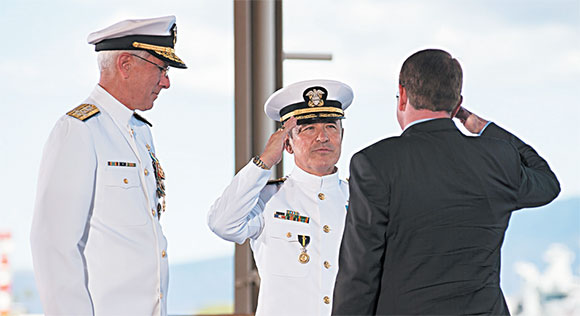Meet Navy’s New Pacific Commander
You can tell a lot about a naval aviator just by his call sign. Recall in Top Gun, Tom Cruise was “Maverick” because he was one, and his crewman was “Goose” because he had a long neck. Call signs are usually awarded by your squadron mates early on in your career, the subject pilot doesn’t have much to say about it, and the call sign usually sticks with you your entire career.
As I was being escorted to the office of Adm. Scott Swift, the brand-new commander of our Navy in the Pacific, a command stretching from the coast of California to the midpoint of the Indian Ocean, one of the public affairs officers escorting me casually referred to the admiral as “Notso.” With his last name being “Swift,” I immediately realized “Notso” was his aviator call sign. (I had known a Marine pilot whose last name was “Bright” and whose call sign was also “Notso”).
By this time, I knew I was about to meet a man with a great sense of humor, a man totally comfortable in his own skin, a man who values the camaraderie of his mates, and a man whose leadership was based upon a strong sense of appreciation and humility.
I soon learned my intuition had served me well.
Four-star Adm. Scott Swift is uniquely qualified to command the Pacific Fleet. All of his previous operational assignments have prepared him well, especially his command of the 7th Fleet, essentially our Pacific operational Navy. And to top it off, he is a native son of Hawaii. While his father was stationed at Pearl Harbor aboard the USS New Orleans, he was born at Queen’s hospital. He barely recalls living in Halawa Heights near Halawa Market, which he was surprised to see is still there. He maintains a true affinity for the place of his birth and feels the aloha spirit is alive and vibrant.

Adm. Harry B. Harris Jr. salutes Defense Secretary Ashton B. Carter as he assumes command of U.S. Pacific Command (USPACOM) during the joint USPACOM and U.S. Pacific Fleet (PACFLT) change of command ceremony at Joint Base Pearl Harbor-Hickam. During the dual ceremony, Adm. Scott H. Swift relieved Harris as the PACFLT commander, and Harris assumed command of USPACOM from Adm. Samuel J. Locklear III U.S. Navy photo by Mass Communication Specialist 2nd Class Johans Chavarro
He related an airport incident, where he witnessed a local man’s commitment to help an elderly stranger who seemed confused. The guy sent his wife on ahead and put his own priorities on hold until he put the stranger on the right path to get where he needed to be. “I love that about this place,” he said.
The admiral especially was pleased that all four of Hawaii’s congressional delegation attended the previous day’s Change of Command ceremony, a portent of good military/community relationships to come, as the Navy and civilian leadership work together to solve the few but nearly inevitable conflicts of interest.
During his earliest Navy days (in the 1980s) as a junior officer, he admits to being ambivalent about a Navy career, but his continued successes in his various assignments always interfered with leaving — so much so that he often has referred to himself as “The Accidental Admiral” (not be confused with another Navy admiral who recently wrote a book by that name).
Obviously from a close-knit family, he told me of his appreciation for the accomplishments of his siblings. “My sister (who attended Punahou) has left a stronger legacy as a school-teacher than I will ever leave as a naval officer, and my brother has accomplished amazing things in basic research.”
He says his dad always says, “I am not proud of my children, I am in awe of them.” He told me of an airport TSA officer who thanked him for his service, and his response was, “No, thank you for your service. We are both working to keep our fellow Americans safe.”
As a part of his leadership style, he always reminds his people that it is their individual success that leads to our common success as families or teams or military units. And he points out this is especially so in Hawaii: “People don’t come to Hawaii for the climate, but for the culture.”
The image of a well-trained team of paddlers comes to mind. He discussed the value of empathy and the importance of “empathic leadership.”
“What is the most important thing I do, you ask? I build relationships. And I believe relationships must be built upon trust, and trust is built upon vulnerability. (Think “Notso.”) And the metric of trust is loyalty. If you have the loyalty of your people, you can accomplish anything.”
He concluded, “You know, I love being back in Hawaii. I feel like I’ve never left.”
coffee1776@gmail.com



